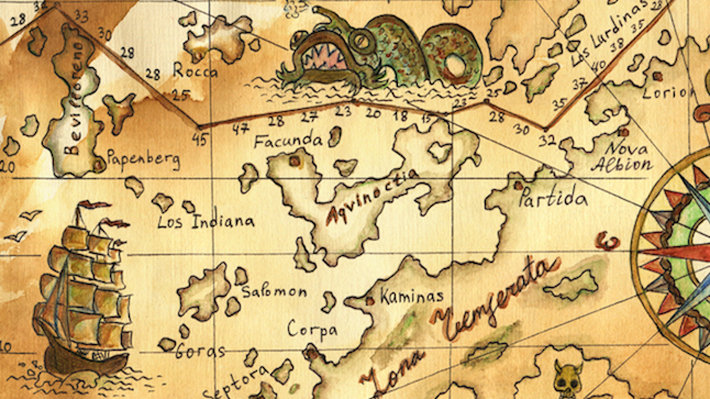How Good People Can Become Bigots
If bigotry were simple, we would have already solved it. But it isn’t and we haven’t.
So here’s a look at the roots of bigotry from a Scientology point of view. You may have heard that Scientology has tools to clarify and improve life, and here is an example of one of those tools.
First, some definitions. (OK I know definitions are boring but bear with me for a few minutes in the faint hope of illumination.)
Rational: Thought and computation that is without encumbrance—not influenced by factors beyond or beneath our awareness.
Rational thought assists survival.
Irrational: Thought or computation that is encumbered—influenced by factors beyond or beneath our awareness.
Irrational thought hinders survival.

Scientology Founder L. Ron Hubbard likened irrationality to an adding machine with one key—the “7”—held down. The adding machine might be operating perfectly, but the answers would always be incorrect. Similarly, the term “computer bug” came from the early days of mainframe computers when a certain computer was making mistakes, and it was found that a moth had been fried between two electrical contacts, thus adding inapplicable data into each computation. The computer was operating correctly, the adding machine was working perfectly, but in each case, added inapplicable data was corrupting the results.
Bigotry is like that.
Like the bug fried between the electrical contacts, a new piece of data was added to every computation.
The human mind operates perfectly, but it is dependent for correct decisions on the data at hand. If a man gets drunk and drives his car into a telephone pole, his mind was working, but alcohol added inapplicable data into his computations—causing the telephone pole to seem irrelevant or located someplace else. So the alcohol added faulty “information” which the mind used to compute a driving decision that did not equate to survival. And, of course, the alcohol also made the body somewhat unresponsive to the being who was supposedly running the mind and the body and the car.
So substances like alcohol and drugs can add faulty data to mental computations resulting in destructive decisions. But there are internal forces at work as well that can change a rational being with a perfectly functioning mind into an irrational being who makes stupid decisions. If deciding to drink alcohol before driving is irrational, what hidden or inapplicable data was added, prompting that decision, and where did it come from?
Well, it comes from the same place bigotry comes from.

Here’s an example: When Mary was a young child, her grandfather was very kind to her, bought her toys, took her for ice cream, and when she fell off her bicycle and hit her head, grandfather rushed her to the hospital. While she was unconscious, grandfather told the emergency room nurse that Mary was the love of his life, and he would do anything to save her. Mary survived, but she had no conscious memory of anything between riding her bicycle and awakening in a hospital room. However, like the bug fried between the electrical contacts, a new piece of data was added to every computation Mary thereafter made: “Grandfather would do anything to save me, so as long as he is with me, I will survive.”
Mary did not consciously decide this. That piece of information was instead generated by a part of her mind she was not aware of—something L. Ron Hubbard calls the “reactive mind.” It was as if grandfather’s statements about Mary being the love of his life, and that he would do anything to save her, were hypnotic suggestions. So decisions she made thereafter included the idea that grandfather was essential to her survival.
As the years went by, grandfather—who had fought in the Vietnam war and hated people from Southeast Asia—began drinking and, after a car wreck, limped heavily. Then he died. Mary was devastated, cried for a week, and her reactive mind—that bug fried between the electrical contacts—amplified the idea that, if grandfather was gone, Mary herself could die. She began to limp, started drinking more, and on the bus one day, shouted at a Southeast Asian woman to go back to Vietnam “where she belonged.” Her family shook their heads; grandfather’s death had rattled her, she was going downhill.
Without realizing it, Mary was keeping grandfather alive. By becoming him.
These “personality transplants” can occur, and one person can become another person, either a loved one or a hated one, and in each case the person can acquire the complete personality of the loved or hated person, warts and all.
Mary picked up his habits, his limp, his bigotry. Grandfather was essential to her survival, said Mary’s reactive mind, so Mary became grandfather, took on his personality and all his bad habits. That personality transplant overcame her with a compulsion to be grandfather. She became an alcoholic bigot because grandfather was essential to her survival. She was creating what is called, in Scientology, a “life continuum.”
Ironically, while Mary’s grandfather was kind to her and she became him, the opposite can also happen.
Liam was a small shy boy, picked on by other boys his age. One day, a bigger boy pushed him off his bicycle and Liam stood up to him. The older boy beat him with his fists and Liam was injured. The older boy stood over Liam and called him a wimp, a girl and a coward and then took his bicycle and rode off. Liam now had a recording in his reactive mind of being unconscious and losing a fight to a bigger stronger boy. Later on, Liam began to pick on smaller boys, calling them cowards, girls and wimps.
So, what happened here? The reactive mind, in its stupid attempt to help Liam survive, looked at Liam and the older boy and decided that it is better survival to be the older boy. The older boy won, Liam lost. Who wants to be Liam and lose? The reactive mind “bug” entered data into Liam’s computations that being like the older boy was the best way to survive. So Liam began beating up smaller boys—it was more survival than to be shy Liam. This was all beneath Liam’s awareness; he just felt more alive when picking on younger, smaller kids.
So these “personality transplants” can occur, and one person can become another person, either a loved one or a hated one, and in each case, the person can acquire the complete personality of the loved or hated person, warts and all. Most people are full of these synthetic personalities. They jump into father’s loud aggressive personality in traffic, into grandmother’s kind personality when cooking dinner, into Uncle Frank’s personality when they go to Las Vegas to party, and so on. The personalities we are aware of can be fun, like an actor playing a role, but when they are installed during pain or unconsciousness and are unknown, they can play havoc with rational thinking.
Understanding the mechanism of bigotry can help one deal with its ugly nature.
How does this problem get resolved? That’s one of the things covered in Dianetics: The Modern Science of Mental Health. Dianetics auditing helps the person find those moments of pain and unconsciousness and gradually reveal what was said and done during these that had undue and unknown influence on the person. Mary recovers the details of her fall from her bicycle, the ER visit, what grandfather said, and suddenly realizes she has been acting like grandfather, and with that realization, the compulsion to be him disappears. Liam realizes he has been acting like the older boy and stops. Incidentally, he also realizes that the older boy is probably acting out something that was done to him by someone else.
So this is one way that basically good people—and they are basically good—can become bullies, drunks and bigots. And Dianetics can erase those reactive computations, those bugs in the mental machinery, those irrational impulses, leaving an unencumbered and rational mind.
In the meantime, understanding the mechanism of bigotry can help one deal with its ugly nature. Even though, as the saying goes, “A lie can travel halfway around the world while the truth is putting on its shoes,” a lie exposed, the truth revealed, is a powerful force.
That’s our mission with STAND.










